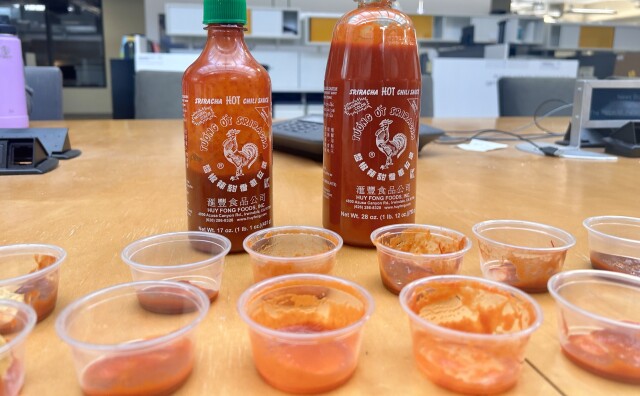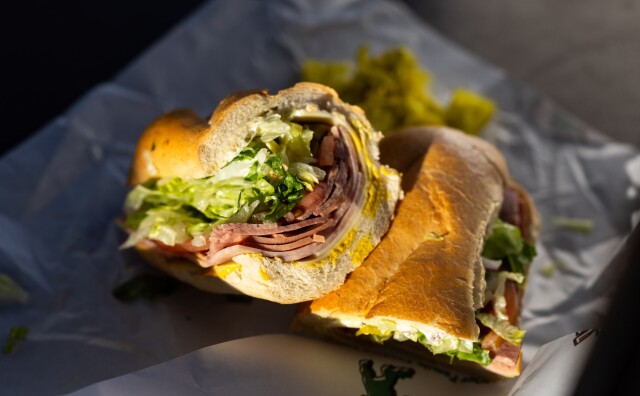At This New Cooking School, Classes Happen In Immigrants' Kitchens

You love eating Indian food and you want to try preparing it but you want to move beyond the greatest hits -- tikka masala, dal, saag paneer, naan -- and explore the deep cuts. Junka, thalipeeth, usali, pachadi. Where do you go? Sure, there's the internet. But without an auntie or a patient friend, how do you make these dishes the right way?
Enter the League of Kitchens. It only sounds like a band of culinary superheroes. League of Kitchens is actually a one-of-a-kind cooking school where all the classes are taught by recent immigrants, in their own kitchens -- and it opens in Los Angeles on Oct. 13.
Lisa Gross, whose mother is a Korean immigrant, launched the school in New York in 2014. She missed her Korean grandmother, who had passed away, and was struggling to cook Korean food from recipes. As part of earning her MFA at Tufts University, she developed a project featuring cooking classes in the homes of immigrant New Yorkers. The initiative was so successful it blossomed into a school.
Four-and-a-half years later, Gross was determined to expand the venture to America's other great immigrant metropolis, Los Angeles. For the past eight months, she and her staff have been finding and training instructors in L.A. while running the school in New York, where Gross still lives.
"Our instructors have a wide range of stories," Gross says. "Some arrived here two years ago. Some have been here since the 1970s, '80s or '90s. Some have the story of coming here by choice. Some were escaping hardship or tragedy."

Smitha Sindagi, from southwestern India, will teach one of the school's first L.A. classes at her home in Palms. Born in Hubli, the second largest city in North Karnataka, she moved around as a child, learning to cook from female relatives in different cities, especially an aunt who lived in Bijapur. After studying electronics and communication at Visvesvaraya Technological University, Sindagi immigrated to L.A. in 2013 to work as a software engineer.
She craved the culinary comforts of home and dreamed of opening a restaurant. Sindagi loves serving as an informal ambassador for North Karnatakan cuisine, with its pronounced differences from most of the Indian food available in the United States. The cuisine leans heavily on sprouted beans, chickpea flour, flattened rice and other specialty grains. Sindagi had trouble sourcing these ingredients until she discovered Little India in Artesia. Then she became a regular at Pioneer Cash & Carry, which has two markets in the city.
There, she can find ingredients like chickpea flour, green chilis, tamarind, and jaggery (a concentrated cane juice). When you sautee them in a pan with onions, scallions, garlic, mustard seeds, cumin, curry leaves and turmeric, you get junka, a dry, crumbly "curry." It's one of the dishes that students will learn to make, under the watchful eye of the Ganesha print hanging in Sindagi's kitchen.

Students will also learn some culinary history, like the fact that "curry" was invented by British colonizers as a blanket term for a meat dish in a western gravy seasoned with Indian spices and served with rice. The word first appeared in print in 1747, in Hannah Glasse's The Art of Cookery Made Plain and Easy.
Sindagi will teach students the multi-step process for sprouting moth beans -- small, drought-resistant beans popular in dry regions of India -- without spoiling them. She adds four cups of water to two cups of dried moth beans then covers and stores them in the refrigerator for at least four hours, maybe overnight. After soaking them, she drains the beans and places them in a sprouting bag or in a few large layered sheets of cheesecloth so they don't dry out. She ties the sack tightly so the beans are cocooned and lets them sit refrigerated overnight, or for at least eight hours, before she cooks with them.
With these tiny sprouts, students will make an aromatic Karnatakan specialty: moth bean usali, a dish that Sindagi refers to as a "curry" but may look more like a salad to students. The earthiness of the sprouted moth beans comes through even after she has added them to a thin tomato sauce with onions, green chilies, shredded coconut and assorted spices.

While instructing students, Sindagi tells anecdotes about going to the farmers markets in North Karnataka as a child. The stories offer mini-lessons in agriculture and geography. "There is a lot of rice grown in south India but a lot of wheat in Punjab and north India," Sindagi says. "That's why there's more roti and bread in the north, more rice in the south and in the midwest there are both."
A typical breakfast in her hometown of Hubli might include aballaki, a salad consisting of rice that has been pounded flat, and uppittu, a hot porridge made with semolina grains. The combo of rice and wheat reflects North Karnataka's location between northern and southern India.
Sindagi never thought differences in India's regional cuisines would interest students but Jessica Yoon, League of Kitchens' L.A. manager, encouraged her to share history and stories from her homeland. Sindagi also cooks without tablespoons or measuring cups, like many home chefs. That's fine if you already know what you're doing but confusing for beginning cooks.
These are a few of the challenges in transitioning from home chef to cooking teacher, so League of Kitchen provides every instructor with 40 hours of paid training. The process helps chefs figure out specific measurements, identify potential pitfalls and contextualize dishes with relevant cultural info. They also develop their patter so they can chat as they cook, a skill that's harder than it looks. A professional recipe tester works with each instructor to perfect the grocery shopping info and recipe packets that students take home.
So far, Sindagi is one of only two League of Kitchen instructors in Los Angeles. Finding people to teach classes has been the most unpredictable aspect of expanding the business. "We're looking for exceptional people -- immigrants who are amazing home cooks, who use traditional techniques and methods, who are warm and engaging, speak English and are willing to host groups of strangers in their homes. Sometimes we find people quickly, sometimes it takes time," Yoon says. The school plans to hire and train more instructors to start teaching this winter.

"I've already learned a lot," says Elmira Avetian, the school's other Los Angeles instructor. "I thought it would be really easy, but it's not. You have to be careful and pay attention. It's easy for you, but not for people who don't have experience in your cuisine. I add a pinch but people want to know how much that is."
Avetian left Georgia (the former Soviet republic not the U.S. state known for its peaches) and settled in Glendale more than two decades ago. With diplomas in accounting, international exporting, music and cosmetology, she's something of a polymath but cooking is her passion.
In L.A., she struggled to find Georgian spices and vegetables and turned to Mexican produce trucks. Those trucks began to open stores. Then, Kozanian's Ranch Market opened in Glendale. It sold a wealth of products made by Anush, an Armenian company founded by relatives of the people who own Kozanian's.

Avetian could, once again, buy jars of Armenian red pepper paste for adjabsandali, an eggplant stew, and preserved grape leaves to make tolma, a generic Armenian term for any vegetable leaf stuffed with meat and rice.
Before Avetian's students touch a stove, she'll take them on a shopping trip to Kozanian's, where they'll pick out the proper ingredients for khinkhali (dumplings filled with minced lamb, beef or pork), khachapuri (a salty, tangy cheese bread) and pkhali (a minced vegetable spread). The dishes reflect her upbringing during the Soviet era.

Avetian was born in Tbilisi, the capital of Georgia, but her parents are Armenian, giving her a window into both cuisines. She can explain the different spices used by each as well as the beverages they favor: semi-dry and dry wines in Georgia versus sweet wines, vodkas and cognacs in Armenia. As Avetian teaches students how to make pali, meat-stuffed cabbage leaves, she will explain that Armenians make a similar dish using grape leaves.
During these lessons, she shares stories about how she learned to cook from her mother and grandmother. She might tell you how, after school, her mother would instruct her, over the phone, on what to prepare for the family dinner. Or she might tell you about the time she catered a wedding feast for her brother and 150 ravenous guests. She'll do it all inside her cozy Glendale home, where neighbors often poke their heads through the kitchen window to say hello.

Avetian spends most of her time taking care of her mother, so she loves having visitors. Georgians and Armenians also have a strong tradition of welcoming guests.
"It's very common for people to come over and for us to host them for long dinners," she says. "Our tradition in Georgia and Armenia is to think of guests as coming from God. God sent this person. We try to treat them as the best person." If students want, Avetian will even read their coffee grounds and tell their future.
Like many Angelenos, Avetian loves Mexican food and occasionally shops for produce at Mexican grocery stores. She is learning Spanish, her fifth language, and she might want to swap tips with you, en espanol, on your favorite taco trucks.

Speaking of L.A.'s dominant cuisine, League of Kitchens is looking to recruit people who can teach Mexican cooking. Down the line, they're also looking to hire people who know Persian, Korean, Thai, Vietnamese and El Salvadorean food.
"There are so many iconic immigrant communities in L.A. We're actively hiring and recruiting two to four more instructors in the next year," Gross says.
League of Kitchens charges $120 for a 2.5-hour "Taste Of" course and $175 for a 4.5-hour immersive. Each class is limited to six people so students receive personal attention. Beyond contributing to immigrant women's incomes, Gross hopes that students benefit from the cross-cultural exchange.
"Some part of the world that may have felt abstract and different now feels personal because of connection and experience, and that's powerful," she says. "What we're really doing is humanizing, recognizing and celebrating the incredible expertise, knowledge and richness that individual immigrants contribute to our culture and society."
Classes at the League of Kitchens begin on October 13. The organization is actively recruiting and hiring more Los Angeles-based instructors. Email instructors@leagueofkitchens.com to apply.

You made it! Congrats, you read the entire story, you gorgeous human. This story was made possible by generous people like you. Independent, local journalism costs $$$$$. And now that LAist is part of KPCC, we rely on that support. So if you aren't already, be one of us! Help us help you live your best life in Southern California. Donate now.
-
After people began complaining online that Sriracha they'd bought recently didn't taste like the old stuff, we set out to find the answer. It didn't go well.
-
From tortas to tuna melts, all sandwiches tell a unique story as they celebrate Los Angeles' diverse tapestry of flavors with each bite.
-
The company behind Sriracha told us production has resumed.
-
Dustin Bartz has figured out a way to sell a $6 smashburger — and still make a tidy profit. He enjoys trolling competitors who charge more.
-
Two amateur bakers take on a beloved, almost sacrosanct school treasure.
-
For Jeff Alulis, the Burger Quest became “something bigger” than him.






